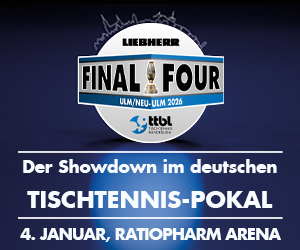Bundesliga

Interview with Kristijan Pejinovic (President TTF Liebherr Ochsenhausen): "The process is the success."
TTF Liebherr Ochsenhausen have to fear for their participation in the play-off round of the German Table Tennis League (TTBL) - and have made a number of personnel decisions during this phase. In this interview, President Kristijan Pejinovic talks about the background to the upheaval, Simon Gauzy's World Championship team silver and - in his role as a member of the TTBL Supervisory Board - also about the target strength of the top German league.
Kristijan Pejinovic, your TTF Liebherr Ochsenhausen are very worried about making the play-offs in the German Table Tennis League. At the same time, you have been initiating a changeover for weeks. What is the connection between these two statements?
Ten years ago, we had the same historic upheaval, back then with Ryu Seung-Min, when we ushered in a new era. The club and I had been thinking about that for some time, but the developments this season have accelerated it in a way, which has less to do with a play-off appearance than with external circumstances such as the WTT or the Olympics. We couldn't go on like this and it was time to lay a new foundation.
The TTF could be mere spectators in the TTBL semi-finals. What problems has your team been struggling with in particular this season?
Can Akkuzu and Samuel Kulczycki have been out of action for a very long time. That has taken a lot of energy out of the players, who have had to step up their game as a result, because their other commitments are not without their problems either. If you take a closer look, that's also the case for other teams, but we weren't lucky and had to let a few players down, which of course hurts. But even if it now looks difficult for our play-off participation, we'll fight to the end - that's what we're known for. We'll see what happens. But the defeats we've suffered were early on and not in the second half of the season, but it hurts when two good regular players are out. There's not much you can do about it.
Despite all the difficulties, your world-class player Simon Gauzy won silver with France at the World Team Championships in South Korea in February. How much Ochsenhausen is involved in this great success?
It's really nice that Simon won silver with his team at the World Championships. That's something very special and something he can be proud of. I think there's definitely a part of Ochsenhausen in this silver medal, but Simon could certainly answer that much better - after all, it's his medal. But I personally hope that we have been able to make a contribution to this in our more than ten years as companions. The fact that he obviously feels comfortable with us is important in itself and can be a decisive factor, as it means that the environment is not a disruptive factor. In any case, we always do everything we can to create the necessary space and make preparations possible. Simon is definitely proud of this medal, and so are we.
When you announced the departure of both head coach Fu Yong and the players Can Akkuzu and Samuel Kulczycki, you mentioned the goal of a new sporting direction from the coming season. What prompted this assessment and what do you want the TTF to stand for in the future?
There is a feeling that another chapter has been written. Another ten years have passed, in which we have also won two titles, as well as many play-off appearances and semi-finals, including in the cup. You can just tell that the time has come for change because certain factors are missing and you can also see how difficult a team is finding it, for example this season, to secure a place in the play-offs. Then you have to provide new impetus in sport, I was already aware of that in the middle of last year, regardless of the current results, especially as we had already changed a lot structurally after corona and some other framework conditions have also changed. You also have to change yourself and no longer just adjust, but really adapt, because you still have to reconcile everything - TTBL, WTT and a twelve-team league - which isn't getting easier, but harder. You have to react and move accordingly. Leaving everything as it is would be fatal under the circumstances described.
You yourself admitted in public statements on player personnel matters that the club "has not managed to bring about more stability and a clear sporting development in the past two years. To what do you attribute these failures?
If a few cogwheels no longer mesh, that can happen. A recurring obstacle is the issue of WTT, because if the players aren't here with us, we can't train them. Our system has changed a lot as a result. As a result, we also have to change. However, a change of scenery is also important for everyone involved at this point; new impetus from other sides or at other locations can also be good. If you part ways, it's not automatically a question of quality, but one of the cogwheels may not mesh and then the whole thing doesn't work. We can continue to rack our brains as to why it didn't work for us, but we have also been able to analyze some areas.
Most realignments are also based on objectives. What are Ochsenhausen's goals?
My goal for the coming season is to start a new chapter. That means a complete restructuring, a new sporting direction - a major overhaul of everything. That means a fresh start in some respects. We can still define further goals later, once all the points have been set. In sporting terms, success is the process for me, not just the results. We are very lucky to have our partners at our side, who are happy to accompany the process and see that we are developing both athletically and organizationally, which is very important in my eyes. If you were only interested in success, you could do what TTC Neu-Ulm used to do and put together a very strong team and buy it. That's not our philosophy. What we stand for is linked to our goals - starting a new chapter and initiating a process with the right direction.
Finally, another topic: you are also a member of the TTBL supervisory board. For the new season, the license application from TTC OE Bad Homburg and Borussia Dortmund means that there will be twelve teams. How important would it be to return to the target number of teams?
It is right and important that the target number of teams is reached again. It is a signal for the attractiveness of the league. The fact that the new teams are likely to be stronger than previous promoted teams also shows that something is there and suggests that discussions have taken place with sponsors and supporters and that the partners have recognized the attractiveness of the TTBL. Accordingly, funds seem to have been made available. This also shows me that our commitment and efforts as a league are finally paying off. However, the full target strength also includes the scheduling issue: we could and had to see last year and also this season with fewer clubs that it is difficult to accommodate everything. In the longer term, the question arises as to how we deal with this: Does the target strength still fit, what should the target strength be, is it still adequate or do we need to change something? But first of all, it is clear that reaching the target strength is an important sign for everyone involved.
Thank you very much for the interview, Kristijan Pejinovic.
Interview: Florian Manzke
Featured image above: Kristijan Pejinovic (Photo: TTF Liebherr Ochsenhausen)








